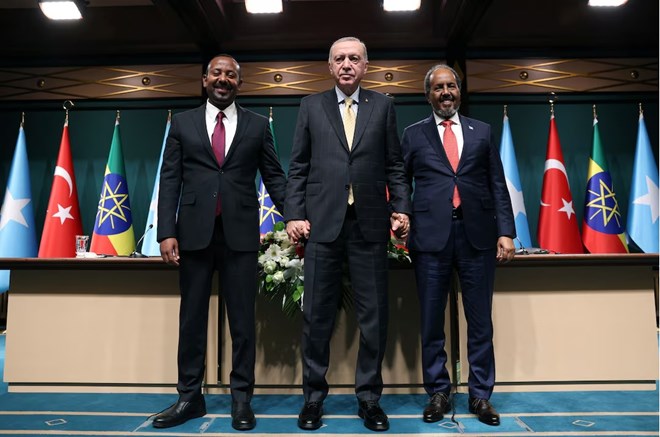
Thursday December 12, 2024

Turkish President Tayyip Erdogan poses with Somali President Hassan Sheikh Mohamud and Ethiopian Prime Minister Abiy Ahmed following a press conference in Ankara, Turkey, December 11, 2024. Murat Kula/Presidential Press Office/Handout via REUTERS Purchase Licensing Rights
ANKARA, Turkey — The Ankara Agreement, brokered by Turkey on Wednesday, has dramatically reshaped the geopolitics of the Horn of Africa. This landmark accord, mediated by Turkish President Recep Tayyip Erdoğan, has nullified Ethiopia's contentious Memorandum of Understanding (MoU) with Somaliland, reaffirmed Somalia's territorial sovereignty, and placed Turkey at the center of the region's power dynamics.
The agreement compels Ethiopia to negotiate its Red Sea access directly with Somalia, invalidating the MoU that granted Ethiopia a 20-kilometer stretch of Somaliland's coastline in exchange for recognizing Somaliland's independence. For Somalia, this is a diplomatic triumph that restores its sovereignty and diminishes Somaliland's bid for international recognition.
The Ankara Agreement decisively reaffirms Somalia's territorial integrity, a principle enshrined in the United Nations Charter and the African Union Constitutive Act. The deal bolsters Mogadishu's claim over the breakaway region by invalidating Ethiopia's proposed recognition of Somaliland.
The deal is a setback for Ethiopia. Its previous deal with Somaliland offered an alternative to its heavy reliance on Djibouti for maritime access. Now, Ethiopia must negotiate sea access through Somalia, a far more complex and politically sensitive process. Addis Ababa's recognition of Somaliland, a key element of the MoU, has also been diplomatically invalidated.
Moreover, Ethiopia's ambitions for economic diversification through Red Sea routes are now delayed. The technical negotiations set for February 2025, with a deadline of four months, will determine the specifics of any future agreements. However, Ethiopia's diminished bargaining power complicates its aspirations.
Addis Ababa's recognition of Somaliland, once a key bargaining chip, has been rendered diplomatically void.
However, it's not all gloom. While the Ankara Agreement, brokered by Turkey in December 2024, nullified Ethiopia's unilateral access deal with Somaliland, it has also opened new doors for Addis Ababa. The agreement compels Ethiopia to negotiate directly with Somalia for maritime access, shifting from isolation to structured diplomacy.
Ethiopia's dependency on maritime access for economic growth has long been a critical issue for the landlocked nation. Theoretically, The Ankara Agreement paves the way for Addis Ababa to negotiate access to multiple strategic ports along Somalia's extensive 3,300-kilometer coastline.
Expanding its maritime options could reduce Ethiopia's overreliance on Djibouti, which handles more than 95 percent of Ethiopian trade. With greater port access, Ethiopia could lower transportation costs, increase export competitiveness, and enhance the resilience of its trade infrastructure.
As things stand, Djibouti emerges as a beneficiary, maintaining its position as Ethiopia's primary trade corridor and capitalizing on Addis Ababa's inability to secure alternative maritime access through Somaliland.
For Somaliland, the agreement is a blow to its aspirations for statehood. Ethiopia's promised recognition of Somaliland's independence under the MoU was a rare win in its decades-long quest for legitimacy. Somaliland finds itself further isolated with the Ankara Agreement, as all future agreements must go through Mogadishu.
This isolation undermines Somaliland's economic leverage, particularly with its Berbera Port. Once envisioned as a strategic hub for Ethiopian exports, the port's relevance has diminished under the new terms of the agreement.
Turkey's role in the Horn of Africa has grown significantly, with the Ankara Agreement further solidifying its position as a key regional player. As a mediator between Somalia and Ethiopia, Turkey has leveraged its military, economic, and diplomatic engagements to assert influence over one of the world's most strategically vital regions.
Turkey's largest overseas military base, Camp TURKSOM in Mogadishu, highlights its commitment to Somalia's security. The base trains Somali forces and bolsters counterterrorism efforts, reinforcing the country's capacity to combat threats like Al-Shabaab. Economically, Turkey has heavily invested in Somalia's infrastructure, managing critical projects such as Mogadishu's Aden Adde International Airport and its seaport. These initiatives enhance Somalia's economic recovery and deepen Turkey's foothold in the Horn of Africa.
The communique accompanying the agreement emphasized Turkey's role, noting that both Somalia and Ethiopia welcomed Ankara's assistance in implementing the terms of the deal.
The Ankara Agreement has sent ripples across the Horn of Africa and beyond, reshaping the dynamics of key regional players. Egypt gains strategically from the agreement, as it curtails Ethiopia's unilateral ambitions for Red Sea access—a critical alignment with Cairo's broader efforts to limit Ethiopian influence in regional disputes, particularly over the Nile River.
Meanwhile, the United Arab Emirates faces setbacks. Its substantial investments in Somaliland's Berbera Port lose strategic value under the new framework, complicating the UAE's aspirations for maritime dominance in the Red Sea.